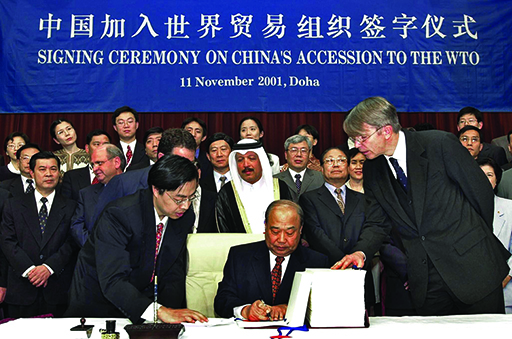2.2 Policy debates
However, in the context of burgeoning external relationships, extensive debates about China’s place in the international system developed. According to Chinese foreign affairs specialist Zhu Liqun (2010), China’s debates focused on three related aspects of China’s relationship to external powers:
- judgements about the overall international context, configuration of power and the direction of processes of change, or ‘Shi’
- China’s identity and responsibility in the international system
- the appropriate strategies China should pursue.
Opinions in China range across a number of positions in all three areas. However, a strong contrast can be drawn between two broad perspectives.
The first perspective, albeit a minority view, evaluates the overall context for China as hostile, with China’s chief responsibility being its national interest defined in terms of its internal developmental needs and stability (Zhu, 2010). In terms of strategy, while some look for a long-term accommodation with the United States, they see this outcome as far from probable and don’t rule out the possibility of major conflict or a Cold-War-style stand-off. Some even fear that the United States will seek actively to constrain or indeed reverse China’s development (Foot, 2006). At the farther reaches of Chinese nationalist opinion, are views such as those held by the authors of the best-selling book Unhappy China, published in China in 2009. These authors argued for an aggressive Chinese policy to assume world leadership and rectify historical wrongs perpetrated against China (Zhu, 2010).
Opposing these views is what Zhu calls the ‘neo-internationalist’ perspective, which emphasises a Shi defined by ‘peace and development’ (in contrast to the ‘war and revolution’ of the pre-1979 era) and the need for China to engage fully and cooperatively with other states. Official policy statements make frequent references to the potential for ‘win–win’ international relationships, emphasising China’s peaceful rise and development, and mobilising historical figures like Zheng He (Admiral of China’s Treasure fleet under the Emperor Zhu Di) to stress China’s peaceful, cooperative heritage (see Section 1). Senior Chinese Communist Party advisor Zheng Bijian summarised the perspective:
[China will] transcend the traditional ways for great powers to emerge, as well as the Cold War mentality that defined international relations along ideological lines. China will not follow the path of Germany leading up to World War I or those of Germany and Japan leading up to World War II, when these countries violently plundered resources and pursued hegemony. Neither will China follow the path of the great powers vying for global domination during the Cold War.
… China does not seek hegemony or predominance in world affairs. It advocates a new international political and economic order, one that can be achieved through incremental reforms and the democratization of international relations. China’s development depends on world peace – a peace that its development will in turn reinforce.
From this perspective there is much greater potential for cooperation with the United States even if that necessitates a process of ‘agonized mutual adaptation’ (Shi Yinhong, cited in Foot, 2006, p. 83).

